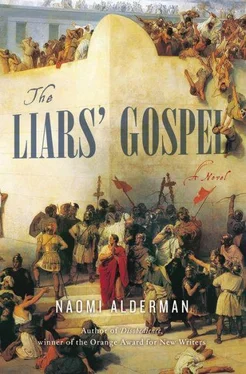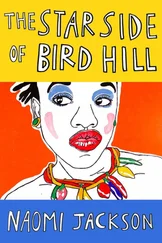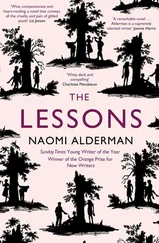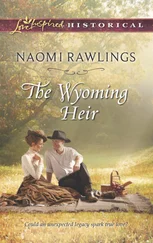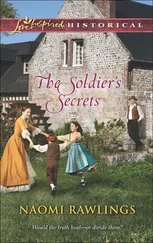All of them know which house he will choose to settle by. Which byre will be his dwelling place. Whose fields he will clear of stones. Miryam is unsurprised when, one morning, she awakes to find him sitting patiently on a rock by her door.
He watches her stumble, morning-stiffened, to the well. She lowers the bucket and twists the rope just so, to make it dip under the water and fill, but when she tries to pull it up he is by her elbow.
“Let me do it.”
And she is old and tired and her knuckles and wrists ache. It is easy to let him. If he wants to, why not let him? He hauls the full bucket up. He is a little clumsy with his half-hand, but he is adapting quickly, as children do. As she watches, he tests out different ways of gripping the rope, settling at last on using the arm with the injured hand to trap the rope close to his body and secure it, while the other hand works to bring up more. He reminds her of a blind man she saw once, reading his way along a wall with a light and interested touch, as though his fingers were eyes.
He carries the bucket for her, a little unsteadily, slopping out more than she would like. He brings it into the room where little Iov and his sister Michal are still sleeping, wrapped around each other. They do not stir. Gidon puts the bucket by the fire. Looks at her. Like a sheep, she thinks, looking for its flock.
“If you pour it into the pot,” she says, “and put the pot on the fire, we can make hyssop tea.” She nods at the bundle of dried leaves hanging from the ceiling beam. “There is bread from yesterday still.”
Favoring his good hand, he hoists the bucket again, pours the water into the pot. Lifts the pot onto the raised stones over the fire. She pokes at the logs with a stick of wood.
“You do not want to talk to me.”
His voice is not accusing. He is calm.
“No,” she says.
“But you let me help you.”
There is no trace of bitterness.
She shrugs. “Do we not read: ‘The Lord will recompense you for the work you have done’?—and so is it not good to work?”
He starts, and stares at her. It is true, a woman of learning is not a common thing, but neither is it entirely unknown. All the people of the village know their letters; one or two of the other women could best her in quoting Torah passages. She knows it is not this which interests him.
“Tell me again,” he says, “or again another thing.”
She shakes her head.
“If you want to learn, there are better teachers than me. Go and seek out a teacher.”
And he says, “I have already done so. My teacher cannot teach me anymore.”
The water begins to boil. She dips in a jug, breaks dry leaves into the water and pours some into a small clay bowl for him, and for her. The well water is good, thank God. It is clean and pure and tastes of old stones.
“If you are willing to work then you are from the Lord. If you work then I will feed you, until the spring, when you should go back to your people.”
There is such happiness in him when she says this that she knows what she has done.
There is a thing she often remembers. It was a little thing. When her first son was only a baby, and she was a new wife, and her husband was so young and strong that he lifted great boulders to make the walls of their sheep pen. In that part of their lives, she remembers, they passed evenings gazing at their little son sleeping. Every first baby seems like a miracle. The old women laugh and say: by number six she’ll forget what name she gave the new one.
But this was their first child. Yosef, her husband, made the baby a cradle of woven branches. Yehoshuah was snug in there, on a bed of fur with a lamb’s-wool blanket.
The thing she remembers is that there was a scorpion. It happened between one moment of looking and the next. The baby was sleeping, she looked away, and then there was a small yellow scorpion in his cradle. Poised over his heart. Yellow scorpions are the most dangerous. When she was a child, a man in the village was stung by a yellow scorpion like that, its tail dripping venom. He died of it, shaking and sweating and crying out for his mother. He was a man of forty and strong in himself.
She looked at the scorpion, sitting on the chest of her sleeping child, and there was not a thought in her head. Every mother knows how it is. There is no thinking or weighing one thing against another. She reached her hand into the cradle, plucked out the scorpion, threw it to the ground and crushed it beneath her shoe to oozing yellow muck.
She had been fast, but scorpions are also fast. It had grazed the skin of her hand with its sting, leaving a faint red score on her flesh. As the day passed, her hand grew hot and heavy, her limbs ached. Her heart pounded, her knees buckled. She thought: I shall die like that man in the village, but it is better that I should die than my baby. When Yosef came home from the fields in the evening, expecting his supper, he found her lying on the straw-filled mattress with hot dry skin and glassy eyes and the baby crying in her arms.
It was three days like that. Yosef brought her well water and she drank a little, and vomited, and the baby would not cease from crying though Yosef fed him goat’s milk from a skin bag. But at the end of three days the fever broke. Yosef had to bring her a pot to piss in because she could not walk to the stone outhouse. Her right arm and right leg, the side the scorpion had stung, were numb like a fallen branch.
She recovered slowly. It was hard, with a small baby, but she was young and strong then and with God’s help she grew well. Her right hand never regained all its cunning. Still it is slower than its fellow, still it will not close into a tight fist only a loose one. She cannot use a needle with the right finger and thumb and had to teach herself to use the left. But she never regretted her action, not as she saw him grow tall and wise and strong. When he was a grown man of twenty she would thank her own hand sometimes for his life. Her hand, and the guidance of God.
But this past year, she thinks: what was it for? What had been the point of all those thousand thousand acts of work and love that go to raise a child? What was the point of any of it, seeing what has happened, and that he has not left even a grandchild from his body to comfort her?
The boy Gidon works hard, there is that at least. Her own grown sons will help her if she is ill, but they have their families now, and Iov, the littlest one, is too small to be much use lifting and carrying. He minds the sheep, but he can scarcely keep his thoughts even on that. Gidon has the single-mindedness that impressed and frightened her the first time they met. He has cleared the back field, which has lain untended since her husband, Yosef, was with them. They will be able to plant wheat in it, or barley, in a month’s time.
He has not asked her more questions. She has not mentioned Yehoshuah. Whenever she speaks of her sons, she says “my son Yirmiyahu, the second one” or “my son Iehuda, the fourth.” So that he will know, and not think she is inviting conversation. He asks her, sometimes, questions about the Torah. She has taught him, a little. It is hard not to, when his yearning is so open within him.
He sees her once giving food to one of the beggars who pass through even an out-of-the-way village like this. A blind woman, making her way with a stick and a bundle of little dolls whittled from wood in her backpack. Miryam slips a few extra apples into the woman’s pack before she walks on with some other travelers.
After she leaves, Gidon says, “My teacher said that the poor will always be with us.”
And she cannot help herself.
“If he wasn’t a fool, he meant that each of us can find someone who has less than us. Don’t you know that every Jew is obliged to give charity? Even the beggars must give.”
Читать дальше
